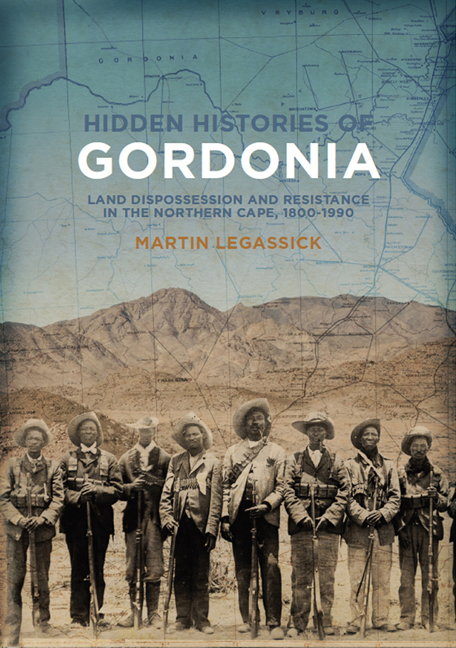Book contents
- Frontmatter
- Dedication
- Contents
- Acknowledgements
- Acronyms and abbreviations
- Illustrations
- Preface
- Chapter 1 The prehistory of Gordonia
- Chapter 2 The Baster settlement of Gordonia and its decline
- Chapter 3 The will of Abraham and Elizabeth September: a struggle for land in Gordonia, 1898–2014
- Chapter 4 From prisoners to exhibits: representations of Bushmen of the northern Cape, 1880–1900
- Chapter 5 South African human remains and the politics of repatriation: reconsidering the legacy of Rudolf Pöch
- Chapter 6 The early history of the brown Afrikaners in Riemvasmaak
- Chapter 7 The battle of Naroegas
- Chapter 8 The Marengo rebellion and Riemvasmaak, 1903–1907
- Chapter 9 The racial division of Gordonia, 1921–1930
- Chapter 10 Keidebees and Blikkies locations, Upington, 1894–1974
- Chapter 11 ‘All my powers have been swallowed by Upington’: the life and times of Alfred Gubula
- References
- Index
Chapter 8 - The Marengo rebellion and Riemvasmaak, 1903–1907
Published online by Cambridge University Press: 20 April 2018
- Frontmatter
- Dedication
- Contents
- Acknowledgements
- Acronyms and abbreviations
- Illustrations
- Preface
- Chapter 1 The prehistory of Gordonia
- Chapter 2 The Baster settlement of Gordonia and its decline
- Chapter 3 The will of Abraham and Elizabeth September: a struggle for land in Gordonia, 1898–2014
- Chapter 4 From prisoners to exhibits: representations of Bushmen of the northern Cape, 1880–1900
- Chapter 5 South African human remains and the politics of repatriation: reconsidering the legacy of Rudolf Pöch
- Chapter 6 The early history of the brown Afrikaners in Riemvasmaak
- Chapter 7 The battle of Naroegas
- Chapter 8 The Marengo rebellion and Riemvasmaak, 1903–1907
- Chapter 9 The racial division of Gordonia, 1921–1930
- Chapter 10 Keidebees and Blikkies locations, Upington, 1894–1974
- Chapter 11 ‘All my powers have been swallowed by Upington’: the life and times of Alfred Gubula
- References
- Index
Summary
This chapter follows from chapter 6 and links Riemvasmaak with the story of Jacob Marengo, a leader of the guerrilla revolt in southern South West Africa between 1903 and 1907, sometimes, and misleadingly, called the ‘Bondelswarts war’, which took place coterminously with the Herero revolt against the Germans. Marengo was the subject of a seminal article by Neville Alexander in 1981, who described him as ‘one of the pivotal characters of the great uprising of 1904–1907’, drew attention to his attempts to create Nama-Herero unity in resistance, and pointed to the relative neglect of him by historians of the then South West Africa. Besides the war against the Herero proper, 14 000–15 000 German troops were deployed in the south of the country to suppress the revolt, led by Marengo and others, of Nama, Oorlams, Herero, Basters, Damara, and perhaps some Bushmen – in which at most a few thousand were involved.
Marengo eventually surrendered to the Cape Mounted Police (CMP) in the area of the present Riemvasmaak in May 1906 in circumstances which will be outlined below. He was imprisoned in Tokai Prison, Cape Town until June 1907 when, despite German attempts to press for his extradition, he was released. He refused to accept the peace terms agreed with the Germans by other leaders of the resistance, and returned to Gordonia where he and some of his followers were killed on 20 September by a detachment of CMP and Cape Mounted Rifles (CMR), accompanied by a German officer, under circumstances described in a recent article. Unfortunately the article suffers from having consulted, apparently, only one file of the many in the Western Cape Archives and Records Service which contain material on Marengo and the several files which deal with his death.
Riemvasmaak: a connection point
The connection between Riemvasmaak and Jacob Marengo emerges from oral historical research conducted by Father Zaby, who ministered to the exiles in Khorigas, removed to South West Africa from Riemvasmaak by the apartheid government in 1974. He postulated five original families who had settled at Riemvasmaak. The first was the Dawids family (we shall return to them).
- Type
- Chapter
- Information
- Hidden Histories of GordoniaLand dispossession and resistance in the Northern Cape, 1800–1990, pp. 229 - 264Publisher: Wits University PressPrint publication year: 2016



